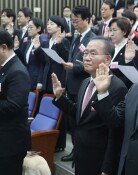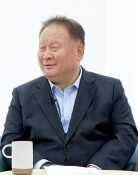Pres. Moon’s direct democracy remark is inaccurate
Pres. Moon’s direct democracy remark is inaccurate
Posted August. 22, 2017 08:21,
Updated August. 22, 2017 08:52
President Moon Jae-in said at a public briefing session on Sunday that South Koreans have demanded direct democracy. The president also mentioned, “Now, the public are dissatisfied with indirect democracy that cast their votes on election day while observing politics as the holders of sovereignty. People think that our politics are falling behind and outdated as a result (of indirect democracy).” He pointed out candlelight vigils and writing Internet comments to express political opinions when people consider the national politics are going the wrong direction as examples of direct democracy.
Article 1 of Constitution of the Republic of Korea stipulates that the Republic of Korea shall be a democratic republic. The sovereignty of the Republic of Korea shall reside in the people, and all state authority shall emanate from the people. The Constitution declares that the public are the holders of sovereignty, but it also describes that people can exercise their rights based on representative democracy and indirect democracy via the National Assembly and president. Also, there are some factors of direct democracy. The main example is the referendum in which an entire electorate is asked to vote on critical decisions of the government, such as constitutional amendment or matters concerning the security of the nation. Modern democracies are derived from direct democracy in ancient times, and the government asks to the public for the most significant issues even in modern days when the size and system of a country gets significantly bigger and complicated to the extent that direct democracy cannot be implemented. However, candlelight vigils that the president commented are to exercise the freedom of assembly, which is irrelevant to direct democracy.
Venezuela has adopted a recall referendum procedure to remove the president from office by the public vote. If South Korea had such procedure and decided ballot measures on the impeachment of former President Park Geun-hye, we could have found concrete will of the public. However, the Constitution of Korea stipulates the impeachment process through the National Assembly and Constitutional Court instead, as the recall referendum or direct democracy procedure would create and huge cost. The impeachment of former President Park was an "orderly impeachment" that was executed according to indirect democratic measures.
Expressing political opinions through Internet comments and making policy suggestions on the government’s homepage should also be considered as exercising the freedom of expression and have little to do with direct democracy. Such activities could be dubbed as "participatory democracy," a term that was widely used during the days of former President Roh Moo-hyun. However, participatory democracy, which the public engage in the process of determining critical issues of a country, is different from direct democracy that people directly decide national issues.
Direct democracy that President Moon expressed as the demand of the public discords with its original meaning as well as the objective of the Constitution. The reason that people feel that Korean politics are outdated is not because of representative system, but because of lawmakers and imperial president who lost their reason of existence. In particular, it should not be regarded that the public disregard the National Assembly, a representative body. It is understandable that the opposition parties criticize the National Assembly all together. It could be a gesture to emphasize that they are trying to communicate with people, but it should not be an excuse to circumvent the Assembly.







